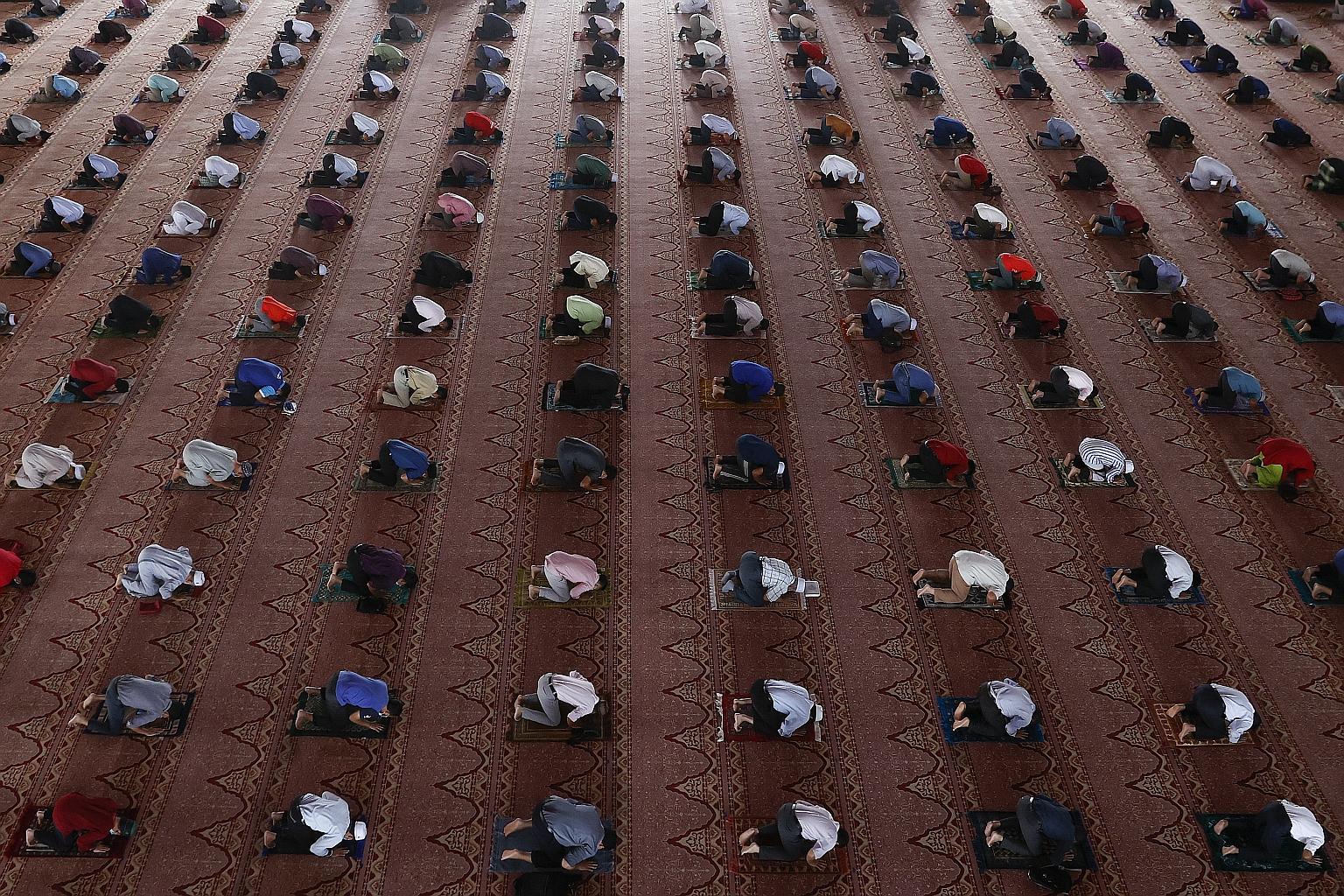Coronavirus Vaccines
Malaysia's anti-vaxxers make U-turn after brush with virus
Many become vaccine advocates following their infection, loss of loved ones to Covid-19
Sign up now: Get ST's newsletters delivered to your inbox

Muslims observing social distancing while attending Friday prayers at a mosque in Putrajaya, outside Kuala Lumpur, last week. Malaysia, which is battling its third wave of the virus, is expected to receive its first batch of vaccines on Feb 26, after securing supply for 40 per cent of its population.
PHOTO: EPA-EFE
Nadirah H. Rodzi Malaysia Correspondent In Kuala Lumpur, Nadirah H. Rodzi
Follow topic:
For many years, Madam Nor Aisyah Amin opposed vaccinations due to her religious beliefs.
She said she believed that eating sunnah food - superfoods that were loved by Prophet Muhammad - was enough to fight health threats.
But when the 42-year-old contracted Covid-19 last year, her sentiments changed.
One of her lungs collapsed and she was placed on a ventilator for more than a week.
The administration clerk said it was "the longest and worst time" of her life and she struggled to focus on recovering.
"Breathing was hard, I thought I was going to die. I was also traumatised, witnessing those around me dying - one minute they were fine, the next they were gone and taken away in a body bag. It was horrible," she told The Straits Times.
Days after attending a family gathering at a red zone - where 41 Covid-19 cases or more are recorded in the span of two weeks - in Selangor last October, she and her 64-year-old mother began showing symptoms of having contracted the virus.
"My mum didn't make it. If only the vaccine were available then, maybe she'd have had a better chance at surviving," she said.
Malaysia is currently battling its third wave of the Covid-19 pandemic, which has killed 872 people and infected 242,452 in the nation since the virus broke out in January last year.
It is expected to receive its first batch of vaccines on Feb 26, after securing supply for 40 per cent of its population through agreements with the Covid-19 Vaccines Global Access facility and pharmaceutical firms Pfizer and AstraZeneca.
Malaysia will have enough vaccines to inoculate almost 83 per cent of the population if agreements with China-based pharmaceutical companies Sinovac and CanSino, as well as Russia's Gamaleya, are finalised.
Whether the Covid-19 vaccine is permissible for use by Muslims has been hotly debated in Malaysia; but there are those who reject it for other reasons.
Mr Kenneth Kong used to believe that medicine and vaccinations are part of an attempt by big pharmaceutical companies "to scam" the public of their money.
"I'm ashamed to admit that I was that person. I was fortunate enough to recover from the virus, but my friend died just days after he tested positive," the 37-year-old automotive engineer told ST.
"It took a friend's death to make me realise that this isn't a joke. We need whatever drugs are available to fight this pandemic and we need the vaccine fast."
But with darkness comes light, said the government's Covid-19 Epidemiological Analysis and Strategies Task Force chairman Awang Bulgiba Awang Mahmud.
He said the valuable experience of a former detractor could serve as a bridge to the truth for those who are still sceptical.
Professor Awang Bulgiba told ST: "What can be more genuine than someone who has gone through the experience of personally combating Covid-19 or losing a loved one to the disease?
"The testimonies of these people are the ones that will appeal to the heartstrings, backed by evidence given by credible scientific experts."
Chiming in, former deputy health minister Lee Boon Chye said engaging the right "influencers" would also help convince the naysayers.
"Having national leaders receiving vaccines is a good publicity stunt; but it's also good to get preachers (from different faiths) to (use their popularity to) advocate immunisations," he told ST, citing popular preacher and philanthropist Ebit Liew as an example.

